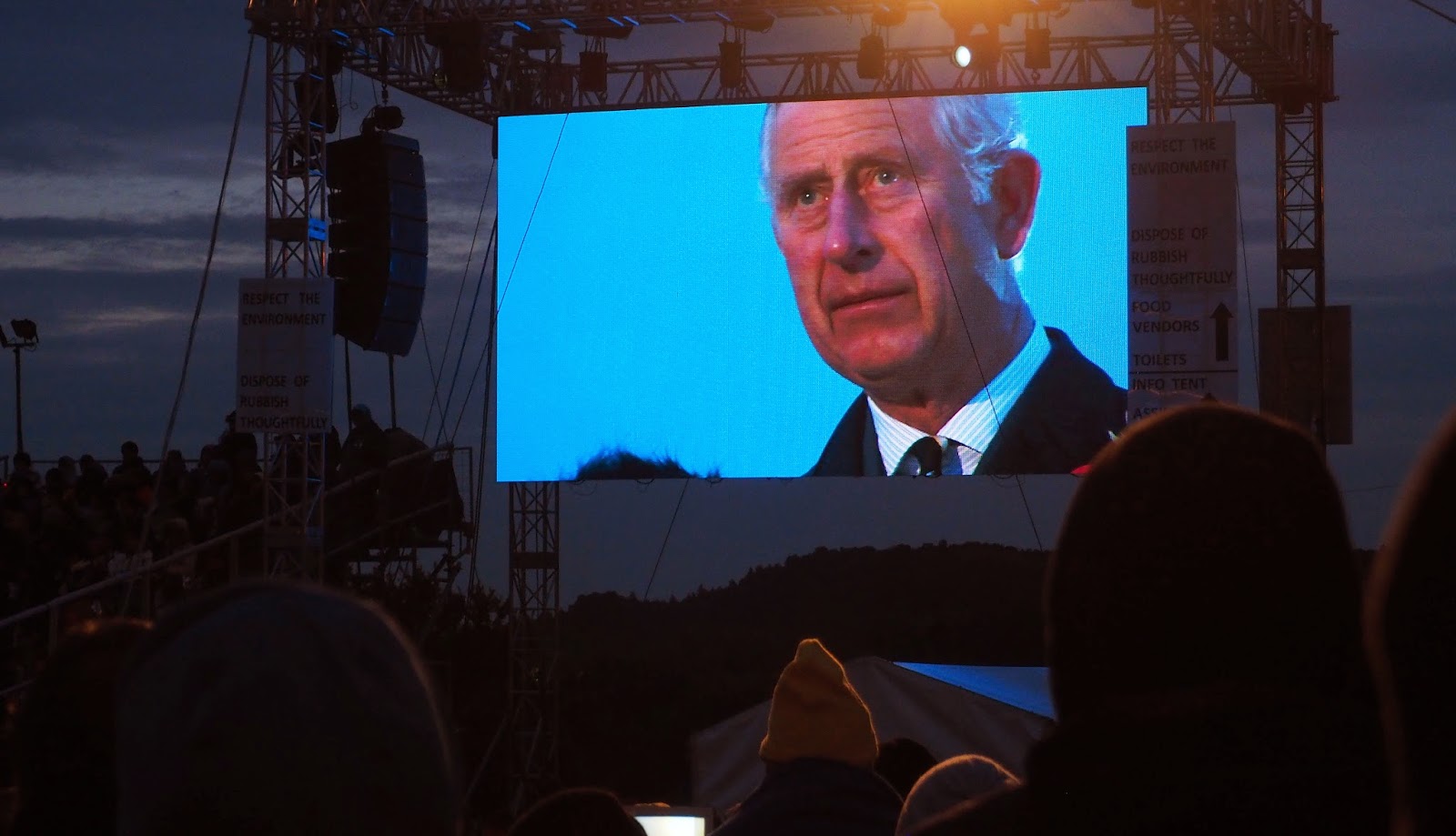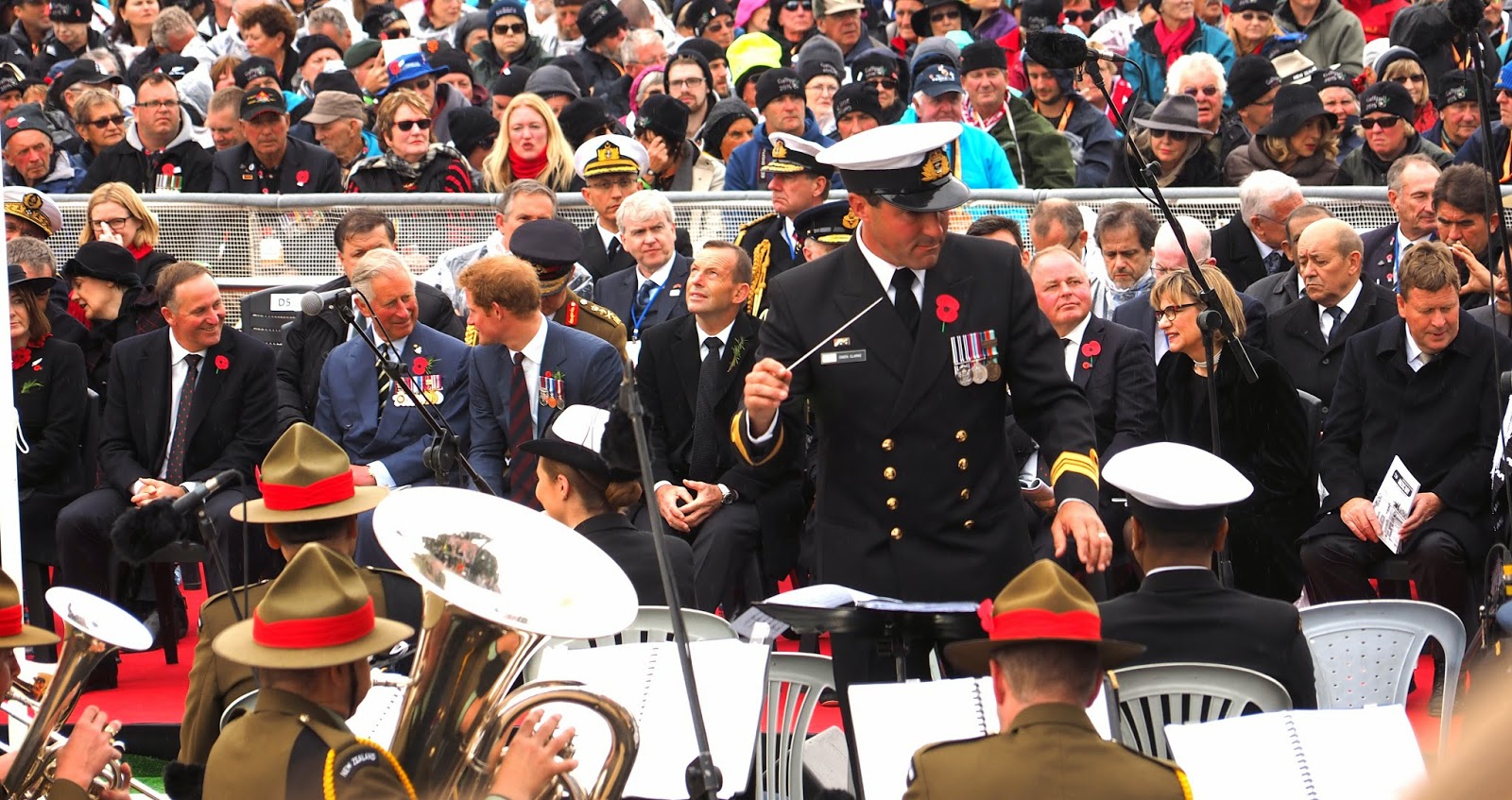Right
from the beginning, the NZ Government’s stream of emails and texts had warned
that visitors to Gallipoli would experience lengthy delays, and urged patience.
Well, they weren’t wrong. A very, very long day – all 29 hours of it – was made
to feel even longer by so much of it spent just waiting. That’s not a
complaint, really, just a fact of life: this is a centenary commemoration, the
first, and a very special occasion, and 10,500 people from NZ and Australia had
come to be part of it. Even our super-efficient Insight Vacations tour director wasn't able to make 6 kilometres of coaches disappear.
We
left our hotel at 5.30pm on the previous day, and struck our first real delay
on the ferry taking us across the Dardanelles to Canakkale. Another ferry from
the British ceremony at Helles, loaded with dignitaries including Princes
Charles and Harry, and various Prime Ministers and ambassadors, was escorted
past us by a flurry of coastguard and police boats as we circled in a holding
pattern. Then it was a slow trip to the first checkpoint where each coach was eventually
boarded by a cheery Australian viewing passes and issuing wristbands; followed
by another slow trip to the next one, ditto, with security screening.
Here
we waited under the pine trees, watching the programme on a big screen while
room was made for us at the Anzac Commemorative Site. After we’d walked a
couple of kilometres along the road and past Anzac Cove to the site, we
understood: a number of those people who’d arrived earlier – by now, dear
reader, it was 2am on Anzac Day, and we were, as the crow flies, really no great distance from our
starting point at Assos – were spread out, fast asleep in
sleeping bags, on the grassed areas that we’d all been repeatedly told had
space for sitting only.
Full
marks to the Aussie MC, though, who via the two giant screens jollied and
cajoled them (once they’d been woken by a few sly kicks from the new arrivals –
oops, sorry, did I wake you?) into making room. We all eventually found a
space, though few of us were able to see down the slope to the centre of
activity, which was disappointing if inevitable given the topography, and most of the time we stood. Those
who’d scored the seats with a view had been there since about 2pm.
So
we sat in the dark, watching on the screens the programme of music and
documentary – well done, that didgeridoo player, especially – and absorbing the
time and place. There were lots of personal touches: letters and epitaphs read, photos flashed up. Every so often we were told what had happened at that moment
100 years before, which was pretty special, and at one point the Sphinx and
other cliffs behind us were lit up while we stood in the dark and listened to
the recorded sound of oars in the water, and real nightingales singing.
The
sky began to lighten, and, at 5.30am, 12 hours after we’d set off, the ceremony
began. It was well done. Our Prime Minister John Key’s speech was good but the Aussies' Tony Abbott’s was too
long and rambling and sent me briefly to sleep. Prince Charles did a reading,
there were letters read by students, there were hymns and prayers, and three
anthems, all sung well, even ours sounding jaunty and un-dirgelike for once.
The Last Post and Reveille were sounded with only one bum note, and then it was
all over.
Was
it special? Yes: to be on the spot where it all happened, exactly 100 years
later, to have visited the cemeteries, stood on the beach, looked at the
gullied cliffs, was special. To be in a crowd that had come so far, who were my
people, who included direct descendants, children of Gallipoli soldiers even, and war veterans, was special. Was it
emotional? No. Perhaps because over the last few days we had heard so many
stories about the battle, had become so familiar with the facts; or maybe
because we were all so tired, having (apart from the selfish sods in the
sleeping bags) had nothing more than snatched moments of sleep all night.
Whatever, no-one I spoke to felt emotional at the Dawn Service, although everybody approved of it. The nearest I
got to a lump in the throat was seeing the silent convoy of naval ships passing by in the background as the sky
lightened and the bagpipes were played, perfectly spaced from the horizon to
the foreground, cruising slowly, respectful.
Last
in, first out. We shuffled away from the site and along the road again, watched
by armed soldiers and hearing skylarks, and set off up Artillery Road, an
unsealed track up the hill to Lone Pine.
Here the Aussies split away for their
service and, after peeling off a few thermal layers (it hadn’t rained or been
seriously cold all night) we carried on another 3km up and down the narrow road
past small cemeteries, past the Turkish memorial to the 57th
Regiment, past the opposing trenches in the pine trees, to Chunuk Bair, where so many died, and we waited. And waited: for the Turks to have their service and for everyone to
arrive. We ate our hotel-supplied breakfasts, and chatted and compared notes,
and watched the Lone Pine service on the screen.
At
1pm we were allowed through from our holding area where the Defence Forces had
been looking after us, and my seat was behind and to the side of the tall
memorial, facing the dignitaries and with a clear view of the Ataturk statue
(its unfinished plinth renovation hidden beneath Turkish flags). We had music
from the band and the Youth Ambassadors, Charles and Harry arrived to press some flesh (“And have you been awake all night?”), all the bigwigs got settled,
a soldier positioned himself with his semi-automatic on the rear platform with
the TV cameras, looking outwards; and the service began.
It
was good. It felt familiar, like family. John Key’s second speech was even
better, Harry did a reading in his remarkably unposh accent, Charles laid a
wreath, there was a solid Maori element, and the Last Post and Rouse, on a 100
year-old bugle engraved with battle names, was perfect.
So,
was it all over? Hardly. We filed back to the marquees and waited another five
hours for our bus to arrive. Five hours! But people were cheerful, the Forces
and especially the MC were focused on maintaining morale (“Anyone feeling sick?
We have a doctor here. Anyone feeling really
sick? We’ve got a chaplain”) and though there was some fading, there was no
real complaining. We were brought hot soup and tea and noodles, and when our
buses finally arrived, there was a corridor of high-fiving Defence people to
walk through. They did a great job.
We
got back to the hotel sometime after 11pm, about 30 hours after we’d left, most
of us having had nothing more than snatches of sleep. Was it worth it? Oh, yes.








No comments:
Post a Comment